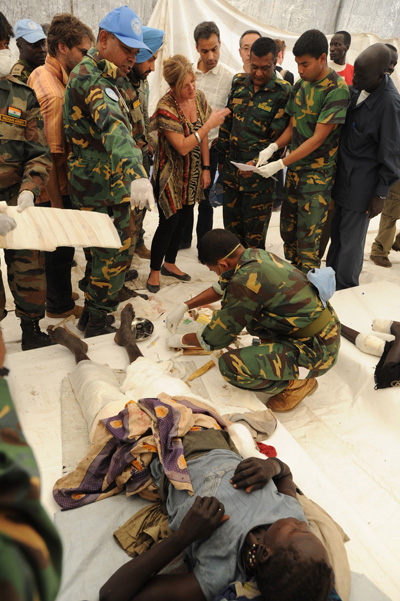
Did the U.N. mission in South Sudan muster all its resources to protect civilians caught up in violence in restive Jonglei state? Certainly some media reports have suggested that the civilian deaths in the midst of ongoing clashes between the Murle and the Lou Nuer have demonstrated the ineffectiveness of U.N. peacekeeping.
Hilde F. Johnson, head of the U.N. peacekeeping mission, or UNMISS, sought to correct this perception and counter the scale of the killing in an oped that appeared on The New York Times website and in The International Herald Tribune. Defiant of the Times’ earlier reporting of the incident, Johnson wrote, “Extensive patrols by UNMISS over the past three weeks have not found the ‘trail of corpses’ stretching ‘miles into the bush,’ as alleged in some press reports.”
But Johnson was quick to acknowledge the human tragedy that unfolded, regardless of the precise figures, and calls for “truthful accounts of events” to best draw out the lessons in the aftermath. After offering a firsthand description of how UNMISS responded to the imminent threat of inter-communal violence, underscored by public statements by Lou Nuer leaders outlining their genocidal intent, Johnson highlighted two important lessons about civilian protections efforts that were starkly on display in Jonglei:
First, there is a need for effective [South Sudan] government action to strengthen security presence in potential flashpoints, get the peace process off the ground, bring to justice those responsible for the attacks and establish programs that address the grievances of the communities.
Second, the United Nations and its members need to act with greater urgency in deploying the full strength of UNMISS troops to South Sudan so that the mission can exercise its mandate to the full in support of the government’s protection efforts.
In particular, Johnson noted the constraints imposed on the peacekeeping mission when it still has not received its full allotment of peacekeepers, nor has access to adequate air support. The government, who bears primary responsibility for protecting its own, was hindered by its inexperience with regards to rule of law, and together, the peacekeepers and South Sudan soldiers were overwhelmed by the sheer expanse of the terrain affected by attacks and counter-attacks.
In short, Johnson’s message was unequivocal: “[N]either the U.N. mission nor the government were standing idly by during the latest crisis.” But what’s perhaps worrisome about the practical challenges Johnson highlighted is that they, for the most part, defy quick fixes. Thus, without explicitly saying so, the oped highlights the need for immediate, concerted efforts by all involved in mitigating violence, because as Johnson points out, “The long-standing conflict between the Lou Nuer and the Murle is far from over.”
Photo: Special Representative of the Secretary General Hilde F. Johnson meets with peacekeepers and injured civilians in Pibor (UNMISS / Isaac Gideon)

